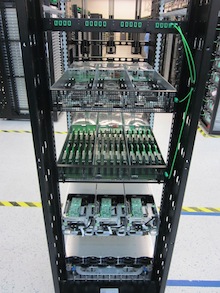Facebook, Intel, and AMD bring more resources to Open Compute Project


The push for open hardware is getting stronger as the Open Compute Project has signed on a number of new commitments and projects from some of Silicon Valley's biggest companies.
Announced amid the first day of the fourth Open Compute Summit in Santa Clara, Calif. on Wednesday, the motivation behind these initiatives is to promote open hardware (specifically data centers and servers) in the same way that open software is promoted.
As big data continues to be a hot topic that doesn't stop growing and still can't be entirely defined, the need for new and fresh hardware designs is imperative.
Here are a few examples of what has already been revealed in less than 90 minutes this morning.
Fresh off its Graph Search announcement on Tuesday, Facebook (also the original official member of the OCP) has contributed to what can be lightly referred to as the "group hug" board.
In more technical terms, engineers from the world's largest social network are contributing a new common slot architecture specification for motherboards, which should turn around and produce vendor-neutral boards that can accommodate up to 10 System-on-Chip circuits.
Those SOCs will be supported by Intel, AMD, Calxeda, and Applied Micro -- the last of which has already built a mechanical demo of the new design.
Intel is also contributing designs from its forthcoming silicon photonics technology, which are intended to enable 100Gbps interconnects -- or enough to last for "multiple processor generations." More pointedly, the photonics technology is supposed to have "such low latency" that the same components previously needed to be bound to the same motherboard can be spread out within a rack.
The OCP has also grown considerably from its founding days a little under two years ago when only Facebook was onboard. Some of the new members for the non-profit community now includes more enterprise-familiar heavyweights such as EMC, Sandisk, and Fusion-io, among many others.
Frank Frankovsky, one of the leaders of the Open Compute Project, added in a blog post that "these announcements will enable data center operators to build systems that better fit the workloads they need to run" as well as "unlock even more efficiencies in data center construction and operations."
Image via The Open Compute Project